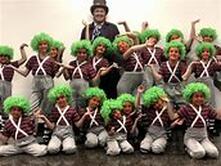
We attended a performance of an adaptation of a very famous book/movie, perfect for a children's theater production. Well...almost. I do not know how the script came about or where it came from, but it was missing some essential elements from the book and had none of the brilliant humor of the movie. It was a bit dry and definitely less than entertaining. Besides, the script had no original musical numbers, so, in their infinite wisdom, the directors randomly inserted one by just playing a song from the movie soundtrack. Out came 30+ little kids to sing and dance along to it. Those children were the brightest spot of the entire show in their adorable costumes doing delightful choreography, BUT YOU COULD NOT HEAR THEIR SINGING! They were overpowered by the voices already on the soundtrack!
This happens quite often in my experience -- from shows produced at dance studios to school productions to church youth talent shows. The leaders think that the children won't be heard or do not sing well enough or they do not have a P.A. system or something, but it never turns out well for them. They may have a point, though, about the children not singing well enough for the standards of their studio. Part of the problem is that they pick material that is not suited to the children's voices. The song is pitched too high or too low or the range is just too wide for the delicate voices to manage.
They might also create choreography that is too demanding for the children to both sing and dance to. They might also block the group away from the mics while they are singing or not have enough body mics to carry the sound of the little voices, or (my favorite pet peeve) they teach dances where the children use loud, heavy steps and overpower their own singing. Those are all very real problems and make the children look ridiculous even if it is not their fault!
My question to these leaders is simply this: How in the world do you think the children will learn to sing better and stronger if they are not allowed the opportunity to sing for themselves???????
Children need material that is suited to their vocal range and their ability to hear and reproduce properly. They should not be trying to imitate adult voices if they have not matured and developed enough vocally to handle it. Most children have a limited vocal range of between Middle C up an octave to Treble C. As they age and mature their vocal range widens. What happens then to kids who try to imitate deeper, mature voices too soon? They compromise their ability to hear and match pitch. No wonder many children grow up to be adults who cannot carry a tune in a bucket!
My counsel is this: Choose material for children that is of a suitable range. Demonstrate appropriate singing technique while teaching them the songs. Never encourage them to yell or to over-sing to make the sound louder. Use restraint in choreography to allow them the opportunity to sing well. And most of all --- Let the children DO THEIR OWN SINGING!
 RSS Feed
RSS Feed